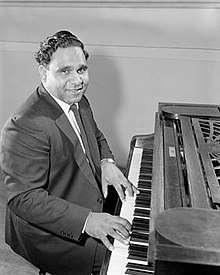Harold Blair
Harold Blair AM (13 September 1923 – 21 May 1976) was an Australian tenor and Aboriginal activist.
Harold Blair | |
|---|---|
 Aboriginal Tenor Harold Blair at piano 1958 | |
| Born | September 13, 1924 |
| Died | May 21, 1976 (aged 51) |
| Nationality | Australian |
| Occupation | Tenor (singer) |
Early life
Blair was born at the Barambah Aboriginal Reserve at Cherbourg, 5 kilometres (3.1 mi) from Murgon in Queensland. His mother was Esther Quinn, a teenage Aboriginal woman. His surname, Blair, came from the family that had "adopted" his mother. He and his mother then went to the Salvation Army Purga Mission near Ipswich. His mother entered domestic service, leaving Harold, then aged two, at the mission, where he received an elementary education. Blair left school at age 16, gaining employment as a farm labourer.
At the age of 17, he was working as a tractor driver at the Fairymead Sugar Mill. Communist trade union organiser Harry Green heard him singing and encouraged him to further his singing. Blair entered a radio amateur hour talent quest in early 1945, and attracted a record tally of listeners' votes. A group of trade unionists, academics and musicians formed a trust to sponsor his career.
Singing career
He entered the Melba Conservatorium in Melbourne in 1945 and earned a Diploma of Music with honours in 1949.[1] In 1950, Blair was invited to study in the United States by the noted African-American singer Todd Duncan. Blair studied at the Juilliard School, New York. While in New York he sang in a church in Harlem, and entered into the community life. He was impressed how people of all races participated at all levels of society.
In 1951, the Australian Broadcasting Commission offered Blair a three-year singing contract, commencing with an extensive tour. By the end of the tour he had lost his voice. Breaking the contract, he was prohibited from singing professionally for three years. Discouraged, Blair sought other work including working for a hardware store. He expressed an interest in education and was taken on as a teacher at Ringwood Technical School. He later became a teacher at the Conservatorium in Melbourne, and served on the Aboriginal Arts Board[2]
Aboriginal activism
Blair continued to act for Aboriginal rights all his life. He joined the Aborigines Advancement League in its early days and later the Federal Council for the Advancement of Aborigines and Torres Strait Islanders. Watching an Aboriginal marching girls group at Moomba in 1962 led Blair to establish the Aboriginal Children's Holiday Project, and he was an early member of the Aborigines Welfare Board in Victoria. He stood as a candidate for the Australian Labor Party for a seat in the Victorian Parliament against the then Minister for Aboriginal Affairs.
Personal life
Blair married a fellow conservatorium singing student, Dorothy Eden, in 1949, and they had two children, Nerida and Warren. The marriage encountered some hostility at the time, as it involved the marriage of an Aboriginal man to a European woman. He now has three grandchildren.
Honours
Blair was appointed a Member of the Order of Australia (AM) in the Australia Day Honours of 1976.[3]
The Australian Electoral Division of Blair in Queensland, created in 1998, is named after him.
References
Bibliography
- Dark Man, White World: A Portrait of Tenor Harold Blair ISBN 0-909091-08-0 (1975) biography by Kenneth Harrison (Novalit Australia Pty Ltd, Cheltenham, Melbourne)
External links
- Transcript of 2004 episode of Message Stick (ABC video documentary)
- Papers of Harold Blair at the National Library of Australia
- 1995 review by Norm Dixon of Harold, a documentary by Steve Thomas
- Harold Blair at the National Film and Sound Archive
- Listen to Harold Blair singing the 'Maranoa Lullaby' on australianscreen online
- 'Maranoa Lullaby' was added to the National Film and Sound Archive's Sounds of Australia registry in 2007